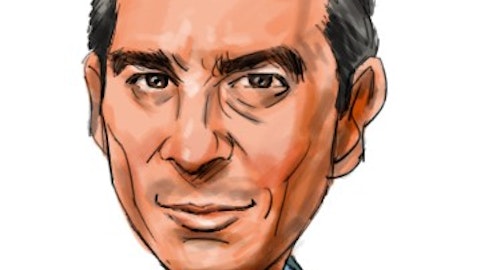If, someday, Apple were to lose virtually all of its innovative abilities, release a series of devices that flop, and encounter severe financial problems, then the dividend would (and should) be cut. Common stockholders are residual claimants, after all. Most equity investors understand that buying stock isn’t akin to buying bonds. Stocks do not represent a contractual relationship, and Apple Inc. (NASDAQ:AAPL)should trust its investors to understand this. But in any event, I don’t see that as a possibility any time soon.
There have been cases in which companies continued to pay dividends even while their ships were sinking, but the flip side is also true: dividends force discipline. Management teams that are held accountable by their shareholders through the form of an expected quarterly payout often don’t have the opportunity to waste shareholder money through foolish acquisitions.
Buy, buy, buy!
Too much cash lying around is a great thing, unless of course a company’s CEO decides to go on an empire-building escapade. When that happens, too much cash is fuel to the fire of management ego. For years, Microsoft Corporation (NASDAQ:MSFT) took in more cash than it knew what to do with. Its response was to buy Skype in 2011 for $8.5 billion, and the benefits from this acquisition are yet to be seen.
The same problem has dogged Hewlett-Packard Company (NYSE:HPQ), which spent $10.3 billion in 2011 to purchase British technology firm Autonomy, representing Hewlett-Packard Company (NYSE:HPQ)’s largest acquisition ever. It took all of one year for Hewlett-Packard Company (NYSE:HPQ) to write-down $8.8 billion of the deal, a major contributing factor behind the company reporting a $12.6 billion net loss for all of 2012.
Now, talk of Apple making a major acquisition is flying through the financial media. Apple Inc. (NASDAQ:AAPL) might buy Twitter for $10 billion. Or, as Jim Cramer suggested on CNBC on March 13, Apple could take over Netflix, Inc. (NASDAQ:NFLX) for $10 billion. After all, what’s $10 billion between friends?
Twitter isn’t publicly traded, so we have little information on what it’s actually worth. Netflix is publicly traded, and earned $0.31 per share in fiscal 2012. That means the company is trading at a trailing price-to-earnings ratio of 580 times. That sounds like a write-down waiting to happen.
The best solution seems to be: dividends
To be fair, Microsoft Corporation (NASDAQ:MSFT) and Hewlett-Packard Company (NYSE:HPQ) have made tremendous progress in allocating capital in a more beneficial manner to shareholders. Each company has taken huge strides in instituting and raising their dividends over the past several years. Microsoft Corporation (NASDAQ:MSFT) pays a hefty dividend yield of 3.25%, and has more than doubled its dividend payout over the past five years. Hewlett-Packard Company (NYSE:HPQ)recently announced a 10% increase in its dividend, and has increased its dividend at a solid 13% compounded annually, over the last five years.
Whatever Apple Inc. (NASDAQ:AAPL) decides to do with its cash hoard, investors can only hope the company chooses the option that provides the maximum benefit to its shareholders. As of now, that appears to be through an increased dividend. A buyback would be a fine idea, but only if the company actually reduces its shares outstanding. Offsetting the buyback by rewarding employees lucrative option packages does shareholders no good.
Were Apple Inc. (NASDAQ:AAPL) to increase its dividend by 50%, which it can easily afford out of its massive cash hoard and annual free cash flow, it would yield 3.5%. With interest rates at historic lows, and the yield on the 10-year Treasury Bond below 2%, what investor in their right mind wouldn’t seriously consider buying the stock? The dividend would not only provide investors more income, but it would likely do a buyback’s work as well. Institutional value investors would have a lot of explaining to do if they refused to buy a 15% earnings yield (after you back out Apple’s cash) along with a 3.5% dividend yield.
The article When it Comes to Big Tech, a Big Debate Rages originally appeared on Fool.com and is written by Robert Ciura.
Copyright © 1995 – 2013 The Motley Fool, LLC. All rights reserved. The Motley Fool has a disclosure policy.

